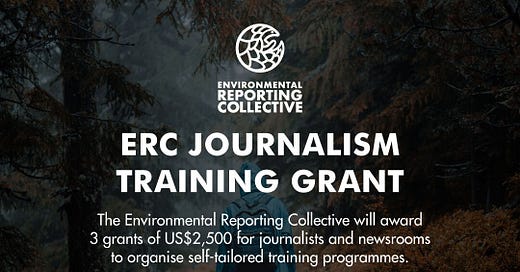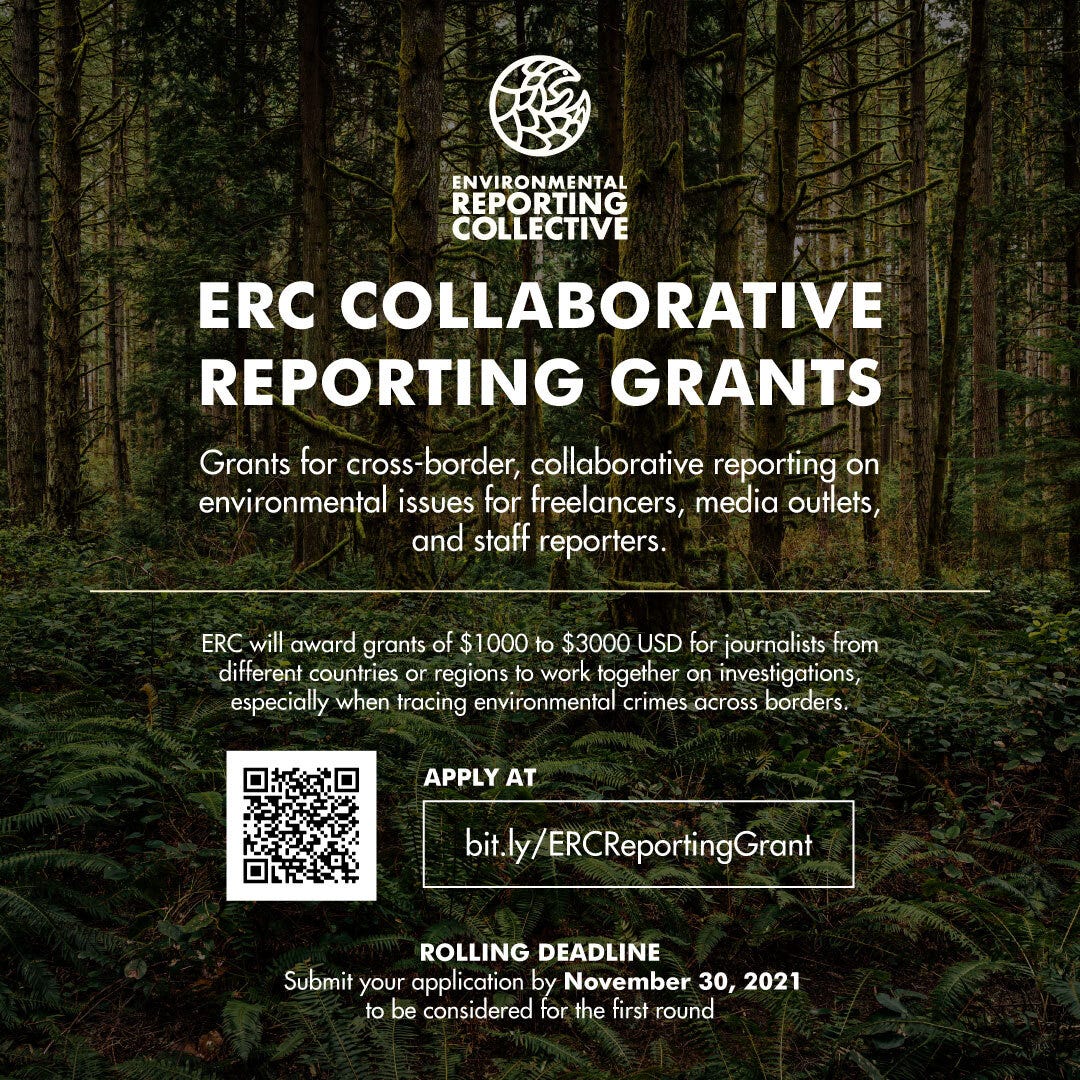Why you should apply for our new grants
We answer questions about the ERC Collaborative Reporting and Training Grant programs
Welcome to Green Echoes, a newsletter from the Environmental Reporting Collective that highlights key investigative stories, data sources, funding, reporting and training opportunities and our projects from across Asia.
Deadlines Approaching! Apply for our Grants
Last month, we announced our first grant programs: ERC Collaborative Reporting Grants, aimed at promoting collaboration or stories tracing environmental crimes across borders, and ERC Training Grants for journalists and newsrooms to organize self-tailored training programs.
In this issue, we wanted to answer some questions about both programs, and encourage you to apply – even if your idea needs some work.
What’s the purpose of the training grants?
Journalism is evolving at a rapid pace. From investigation techniques and tools, audience engagement and community building, storytelling platforms to business models, newsrooms and journalists are struggling to equip themselves with the skills and instruments to do their jobs better. We want to help you organize training programs tailored to your needs. In addition to funding, we are happy to provide advice and connect you with trainers and resource persons based on what you need.
Why can’t I apply by myself for a reporting grant?
ERC’s core focus is collaboration. It was what got us started on our first project, The Pangolin Reports, and our projects since then, including Oceans Inc. We see tremendous value in reporters working together, across borders and newsrooms, on investigations.
That being said, we know it's hard to find a collaborator, and are willing to help. If you have an idea, but no collaborator, do one of two things
Respond to this email and one of us would be happy to share ideas on how to find someone to work with. We can assist in finding a newsroom, or freelancers, to collaborate with in another country.
Join the ERC Slack Group and propose ideas to our community of over 150 journalists, editors, and media supporters.
What exactly is environmental crime?
We define environmental crime broadly. Essentially, an environmental harm that has a trans-boundary connection of some sort should be sufficient. Examples includes
IUU Fishing and marine ecology
Trafficking of endangered or rare wildlife and plant species
Supply chains and their impacts on forests or landscapes
Pollution and impacts on local communities
We also strongly encourage applications to include other angles, such as human/Indigenous rights, gender, and social impacts. We want to include meaningful stories from impacted communities in our reporting as much as possible.
Can you give me an example of a training grant idea?
Let me give you three. It can be
A series of workshops on using satellite imagery to investigate surface changes or environmental crimes,
a course on product management to help newsroom managers develop new products
a design thinking workshop for journalists to improve their storytelling.
But please, be creative! We want to minimize the limitations to give you the freedom to tailor the training to your needs. The only requirement is that the program should be conducted online or hybrid, and be open for other ERC partner newsrooms and journalists to participate.
My idea is still broad – is that okay?
Yes! We understand that many ideas require, well, reporting to flesh out. That is the purpose of the grant, to enable you and your collaborators to dedicate time to investigating your idea. Please provide as many details on the idea as possible, and then focus on providing details in your reporting plan – that will help us understand how you plan to investigate and report your idea.
Training Grants Deadline Nov 20th
Reporting Grants — apply by Nov 31st for Round 1 (applications received after this will be considered in round 2).
If you have other questions about either grant program, respond to this email or leave a comment, and we’ll get back to you shortly.
Opportunities and Resources
Last chance: The Global Initiative Against Transnational Organized Crime is accepting applications for its 2022 Resilience Fellowship, which will have environmental crime as its theme. It provides grants of up for $15,000 for one year (deadline 15 Nov)
GRID-Arendal is offering grants for investigative journalism projects focused on environmental crime in developing countries. Six grants of about $2500 will be offered (deadline 30 Nov).
The Logan Nonfiction Program is accepting applications from journalists for its fellowship program, which will be hybrid this year. It aims to support longform projects (deadline 15 Dec).
Resources from the Investigation is Collaboration - Exposing the Invisible Together conference are now available online. They include guides on collaborative investigations, data, networking, and much more.
That’s all for this week. We’re always open to including other resources/trainings in this newsletter, so if you have something you’d like us to share, let us know by responding to this email.
Stay safe and healthy,
Nithin Coca and Kuek Ser Kuang Keng
The Environmental Reporting Collective is a growing network of journalists and newsrooms from over a dozen countries, all dedicated to investigating environmental crimes collaboratively.
To learn more about our work, check out our website, Investigative.Earth, and follow us on Twitter and Facebook.





